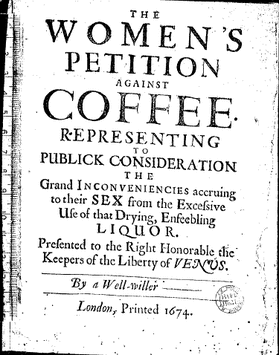 1674 Wing / 829:44 1674 Wing / 829:44 I've started work on book three in my Lucy Campion mysteries, and I just got the copy edits for From the Charred Remains (being released in April 2014!) So I'm going to have to take an extended coffee break. As always, I will leave you with a coffee-related question to ponder. Why in the world would women (allegedly!) be petitioning against coffee in 1674?
1 Comment
 A while back, I was contacted about participating in a local author fair. Not only was I just personally delighted, given how much I love libraries and librarians, but I was just amazed when I saw who had extended this very kind invitation. The Joliet Public Library, Black Road Branch. In Joliet, Illinois. Now before I came to live outside Chicago, I grew up in Philadelphia. My father, however, had grown up in Joliet Illinois. His mother, my grandmother, worked at the main branch of the Joliet Public Library for thirty years, retiring shortly after I was born in 1971. In an interview published in the Joliet Herald-News dated December 26, 1971, my grandmother explained that she'd started as an apprentice at the library, working her first two and a half months without pay! Initially, she mainly shelved books, but was also called on to mend books as well: "There were no book binders at that time, so when books became damaged by usage and wear, we sewed them by hand. I learned how to build a book from the bottom up."-Josephine Calkins 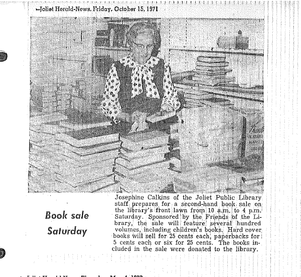 My grandmother, 2 weeks before I was born! My grandmother, 2 weeks before I was born! She left the library in 1936 to get married--my father says she met his father at the library! After taking coursework at the University of Illinois library school, she returned to the Joliet library in 1953, working in the children's, reference, and adult departments. From 1956 to 1965, my grandmother was in charge of the library's bookmobile, before becoming an assistant librarian. The experience at the bookmobile, she said, helped her learn about what people liked and disliked, which later informed her purchasing decisions. 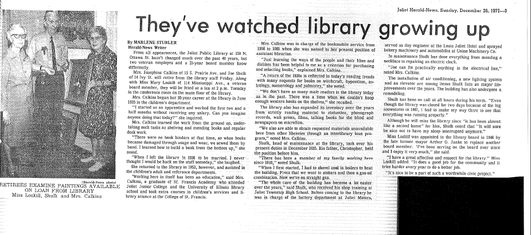 When asked to reflect, in December 1971, about what had changed since she first started working at the library, she had this to say: "A return of the 1930s is reflected in today's reading trends with many requests for books on witchcraft, hypnotism, astrology, numerology and palmistry....We don't have as many male readers in the library today as in the past. There was a time when we couldn't keep enough western books on the shelves...." I can only imagine what my grandmother would think of current library trends now. Back then, microfiche and microfilm collections as well as "The New InterLibrary Loan Program" were just starting to transform how library patrons could access materials. What would she think of the digital revolution?
Unfortunately, my grandmother passed away in 1987, so we can't know. From what I do remember, she had a deep and abiding love of books, which she passed on to my father and my siblings. I'd imagine she'd be thrilled at the ready access of books and the long reach that modern libraries can attain. (The other thing I remember about my grandmother was that she taught me to embroider, on one long visit to Philadelphia. While I appreciate that skill, I can't help but wish now she had also taught me how to build a book--a worthy skill indeed!) As I've mentioned before, I grew up in a house literally lined with books, many of them bequeathed to us from my grandmother. I truly believe that my love of writing stems from my love of reading, a trait inherited from both my parents (my mother was also a librarian). So I believe it will be quite a moment when I set up my table on Saturday. On one side, my first novel, A Murder at Rosamund's Gate. On the other side, the photos of my grandmother passing out books at the Joliet bookmobile. My parents are even making the trek out! I don't know what to expect exactly, but I'm sure it will be great! 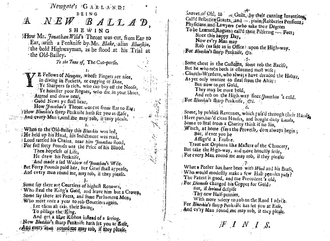 Anon., Newgate's garland (1724) (Wing C17:1[219b] Anon., Newgate's garland (1724) (Wing C17:1[219b] I started writing a post about murder ballads (which I've discussed on my blog before), to share specific examples about how crime was both a source of entertainment and news in early modern England. At random I selected a ballad to discuss, mainly for the gallows humor embedded in the title: "Newgate's Garland: Being a New Ballad shewing How Mr. Jonathon Wild's throat was cut, from ear to ear, with a penknife by Mr. Blake, alias Blueskin, the bold highwayman, as he stood at his trial at the Old Bailey."  the "newgate garland" may not be this festive the "newgate garland" may not be this festive A garland can refer to a miscellany, or a collection of literary works--so this ballad may have been one of several in a collection. But 'garland' also refers to a strand of material or wreath of flowers, usually hung in celebration. So I can only imagine there was a garland of sort that appeared when poor Mr. Wild's throat was slit "from ear to ear." Clearly there is a sense of celebration throughout this ballad, as the first stanza indicates: "Ye fellows of Newgate, whose fingers are nice, in diving in pockets, or cogging of dice, Ye Sharpers so rich, who can buy off the noose, Ye honester poor rogues, who die in your shoes, Attend and draw near, Good news ye shall hear, How Jonathan's throat was cut from ear to ear, How Blueskin's sharp penknife shall set you at ease, and every man round near me, may rob if they please." 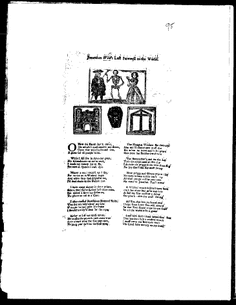 But why would slitting Mr. Wild's throat be a cause for celebration? I began to wonder who Mr. Wild was. So I looked for additional ballads and pamphlets that may explain why Blueskin, that noted highwayman, had sought to murder him. That's when I found another ballad, this one titled: "Jonathan Wild's final fairwell to the world." This would seem more promising. Yet I noticed right away that this ballad was dated in 1725, a full year after the other ballad. Moreover, this ballad described how Jonathan Wild was executed at Tyburn Tree, not murdered at all. Certainly, there was no mention of the throat-slashing incident. So a little MORE digging revealed a fascinating story... As it turns out, Mr. Jonathan Wild was quite famous. After being arrested for debt in 1710, he was thrown into prison. During this time, he began to play two sides of the justice system. In a highly corrupt prison system, Wild first began to do small tasks for the jailers, to a point where he was even trusted to leave the prison to run errands. After a short time, he became a "thief-taker," which was akin to a bounty-hunter in this period before the establishment of a systematic police force. Great Britain's Privy Council even consulted with him on the best way to reduce crime in the country. His answer, not surprisingly, was to raise the reward given to thief-takers from forty pounds per criminal, to a hundred pounds each. Yet, even as he publicly brought criminals to justice--by some accounts, he brought nearly fifty criminals to justice--he was also running a large criminal operation of his own. Wild did very well for himself for quite some time, but his luck turned sour when he was caught helping some of his men break out of prison. Brought to trial, he was mocked roundly by thieves. It was at this point that Blueskin took that near-fatal swipe at him. That part of the ballad makes a little more sense now: "When to the Old-Bailey this Blueskin was led, He held up his Head, his indictment was read, For full forty pounds was the price of his blood. Then hopeless of life, He drew his Penknife, And made a sad widow of Jonathan's wife, But forty pounds paid her, her grief shall appease, and every man round me, may rob if they please. 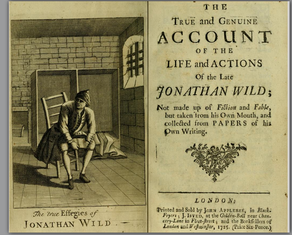 Wild was in jail for some time, until he was finally brought to the Tyburn Tree for hanging. People were so eager to see him executed that they waited for hours before he arrived. Along the way, Wild was subject to great physical and mental abuse, even having rotting animals and feces thrown upon him as he was carted towards his hanging. He seems to have been dazed and disoriented by the time he emerged from the cart. After he died, apparently his body was stolen, illegally dissected by surgeons, and ended up on display at the Hunterian Museum in London. Already famous before his death, Jonathan Wild became further immortalized when Daniel Defoe wrote about his exploits and sojourn into organized crime. Later, the novelist Henry Fielding--who as a young man was among the spectators of Wild's execution--parodied the man's life and death in the fictionalized History of the Life of the Late Mr. Jonathon Wild the Great (1745). (Check out, too, historian Peter Ackroyd's wonderful discussion of this parody). Who knew that this murder ballad--which actually turned out to be an attempted murder--would have an incredible back story! |
Susanna CalkinsHistorian. Mystery writer. Researcher. Teacher. Occasional blogger. Categories
All
Archives
May 2023
|
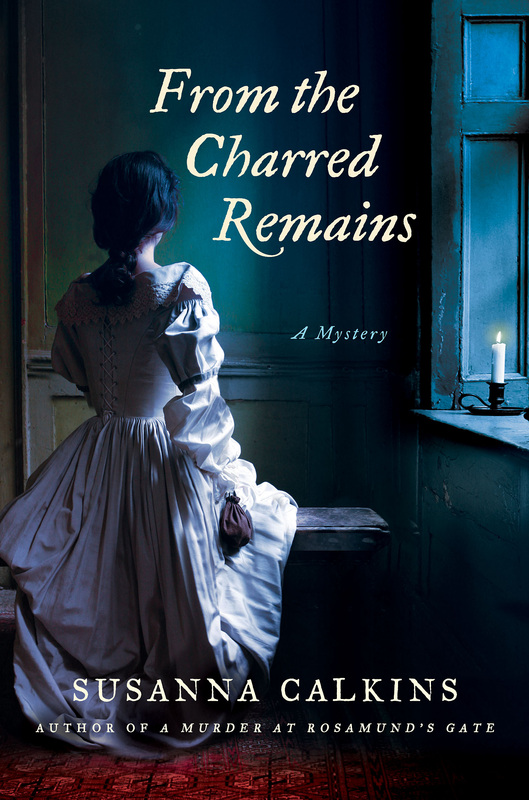
 RSS Feed
RSS Feed